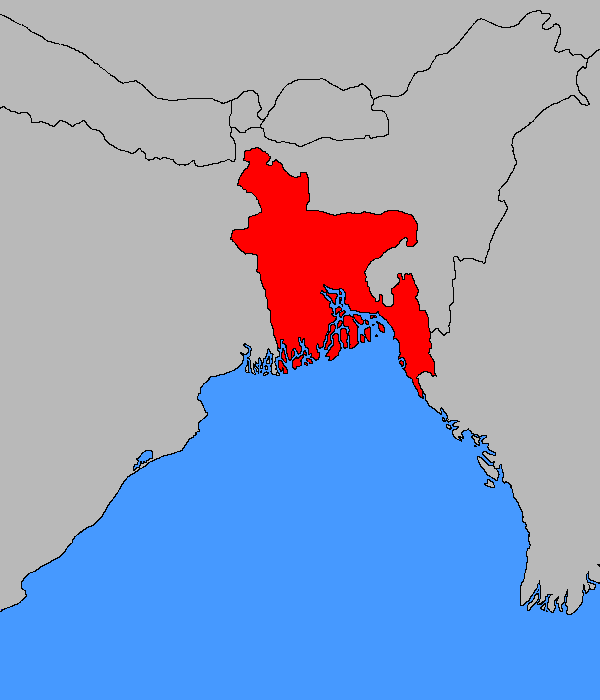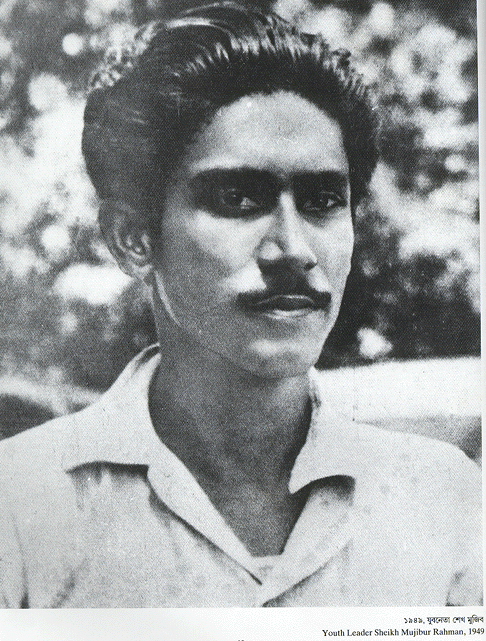
East Pakistan Renaissance Society
Encyclopedia

Two-Nation Theory
The Two-Nation Theory proposed by Allama Iqbal is the ideology that the primary identity of Muslims in the Indian subcontinent is their religion, rather than their language or ethnicity, and therefore Indian Hindus and Muslims are two distinct nationalities, regardless of ethnic or other...
for Indian Muslims and specifically for the Muslims of Bengal
Bengal
Bengal is a historical and geographical region in the northeast region of the Indian Subcontinent at the apex of the Bay of Bengal. Today, it is mainly divided between the sovereign land of People's Republic of Bangladesh and the Indian state of West Bengal, although some regions of the previous...
. The organisation's founders and leaders included Abul Kalam Shamsuddin
Abul Kalam Shamsuddin
Abul Kalam Shamsuddin was a journalist, politician and littérateur. He was born at Trishal of Mymensingh.-Early life:...
, the society president, Muhammad Habibullah Bahar and Sheikh Mujibur Rahman
Sheikh Mujibur Rahman
Sheikh Mujibur Rahman was a Bengali nationalist politician and the founder of Bangladesh. He headed the Awami League, served as the first President of Bangladesh and later became its Prime Minister. He headed the Awami League, served as the first President of Bangladesh and later became its...
.
Foundation
The "Two-Nation TheoryTwo-Nation Theory
The Two-Nation Theory proposed by Allama Iqbal is the ideology that the primary identity of Muslims in the Indian subcontinent is their religion, rather than their language or ethnicity, and therefore Indian Hindus and Muslims are two distinct nationalities, regardless of ethnic or other...
", which argued that the Hindus and Muslims of India were not a common nation and could not live together as a nation, had been propagated by Muslim politicians and intellectuals such as Sir Muhammad Iqbal, Choudhary Rahmat Ali
Choudhary Rahmat Ali
Choudhry Rahmat Ali was a Pakistani Muslim nationalist who was one of the earliest proponents of the creation of the state of Pakistan. He is credited with creating the name "Pakistan" for a separate Muslim homeland in South Asia and is generally known as the founder of the movement for its...
and Muhammad Ali Jinnah
Muhammad Ali Jinnah
Muhammad Ali Jinnah was a Muslim lawyer, politician, statesman and the founder of Pakistan. He is popularly and officially known in Pakistan as Quaid-e-Azam and Baba-e-Qaum ....
, the president of the All India Muslim League. The demand for a separate state for Indian Muslims took definite shape when the All India Muslim League adopted the Lahore Resolution
Lahore Resolution
The Lahore Resolution , commonly known as the Pakistan Resolution , was a formal political statement adopted by the Muslim League at the occasion of its three-day general session on 22–24 March 1940 that called for greater Muslim autonomy in British India...
(also known as the Pakistan Resolution) on March 23, 1940. The resolution called for the Muslim-majority provinces of British India to be constituted as a separate, independent states - it did not specify a single state.
At a meeting held on August 30, 1942 at the headquarters of the Dainik Azad newspaper in Kolkata
Kolkata
Kolkata , formerly known as Calcutta, is the capital of the Indian state of West Bengal. Located on the east bank of the Hooghly River, it was the commercial capital of East India...
(now Calcutta), Bengali Muslim activists decided to form the East Pakistan Renaissance Society as a platform to advocate the idea of a Muslim state on a cultural and intellectual basis. The Society's membership constituted of journalists, student activists, intellectuals and members of the Bengal Muslim League. The society held its first council at the Islamia College
Maulana Azad College
Maulana Azad College is located in central Calcutta, West Bengal, India. It is located near the junction of Rafi Ahmed Kidwai Road and SN Banerjee Road, popularly called "Lotus crossing".It is a Government college and affiliated to the University of Calcutta...
in Kolkata in 1944.
Philosophical differences

Punjab (British India)
Punjab was a province of British India, it was one of the last areas of the Indian subcontinent to fall under British rule. With the end of British rule in 1947 the province was split between West Punjab, which went to Pakistan, and East Punjab, which went to India...
, Khyber Pakhtunkhwa (then Northwest Frontier Province), Sindh
Sindh
Sindh historically referred to as Ba'ab-ul-Islam , is one of the four provinces of Pakistan and historically is home to the Sindhi people. It is also locally known as the "Mehran". Though Muslims form the largest religious group in Sindh, a good number of Christians, Zoroastrians and Hindus can...
, Balochistan
Balochistan
Balochistan or Baluchistan is a region which covers parts of Afghanistan, Iran and Pakistan. It can also refer to one of several modern and historical territories within that region:...
and Bengal
Bengal Presidency
The Bengal Presidency originally comprising east and west Bengal, was a colonial region of the British Empire in South-Asia and beyond it. It comprised areas which are now within Bangladesh, and the present day Indian States of West Bengal, Assam, Bihar, Meghalaya, Orissa and Tripura.Penang and...
, and sought the Urdu language to be the only official language and lingua franca of Muslims. However, the East Pakistan Renaissance Society not only argued that Muslims were a separate nation from Hindus, it also advocated that the Bengali Muslims were distinct from the Muslims of other parts of India, on an ethnic, cultural and geographical basis. Unlike religion, the society argued that ethnicity and cultural differences cannot cross geographic boundaries. The society and its supporters in the Bengal Muslim League asserted that Bengali Muslims should constitute an independent state, as an "Eastern Pakistan" rather than part of a single state of Pakistan. The society asserted the importance of the Bengali culture and language, which many advocates of Pakistan criticised as being "Hinduised" and "Sanskritised."
Aftermath
The society dissolved after the partition of IndiaPartition of India
The Partition of India was the partition of British India on the basis of religious demographics that led to the creation of the sovereign states of the Dominion of Pakistan and the Union of India on 14 and 15...
in 1947, which also partitioned Bengal to create the Muslim-majority East Bengal
East Bengal
East Bengal was the name used during two periods in the 20th century for a territory that roughly corresponded to the modern state of Bangladesh. Both instances involved a violent partition of Bengal....
(also known as East Pakistan), which became part of Pakistan; Hindu-majority West Bengal
West Bengal
West Bengal is a state in the eastern region of India and is the nation's fourth-most populous. It is also the seventh-most populous sub-national entity in the world, with over 91 million inhabitants. A major agricultural producer, West Bengal is the sixth-largest contributor to India's GDP...
and Assam
Assam
Assam , also, rarely, Assam Valley and formerly the Assam Province , is a northeastern state of India and is one of the most culturally and geographically distinct regions of the country...
became part of India. Several of the society's leaders were leading activists in the Bengali language movement (1953-1956), which was a mass struggle in East Pakistan for the recognition of the Bengali language as the second official language of Pakistan, along with Urdu. The society leader Sheikh Mujibur Rahman became the chief of the Awami League, which argued for greater autonomy for East Bengal and strengthening of Bengali culture, and subsequently spear-headed the Bangladesh Liberation War
Bangladesh Liberation War
The Bangladesh Liberation War was an armed conflict pitting East Pakistan and India against West Pakistan. The war resulted in the secession of East Pakistan, which became the independent nation of Bangladesh....
, which led to the independence of East Bengal from Pakistan, becoming the People's Republic of Bangladesh.

